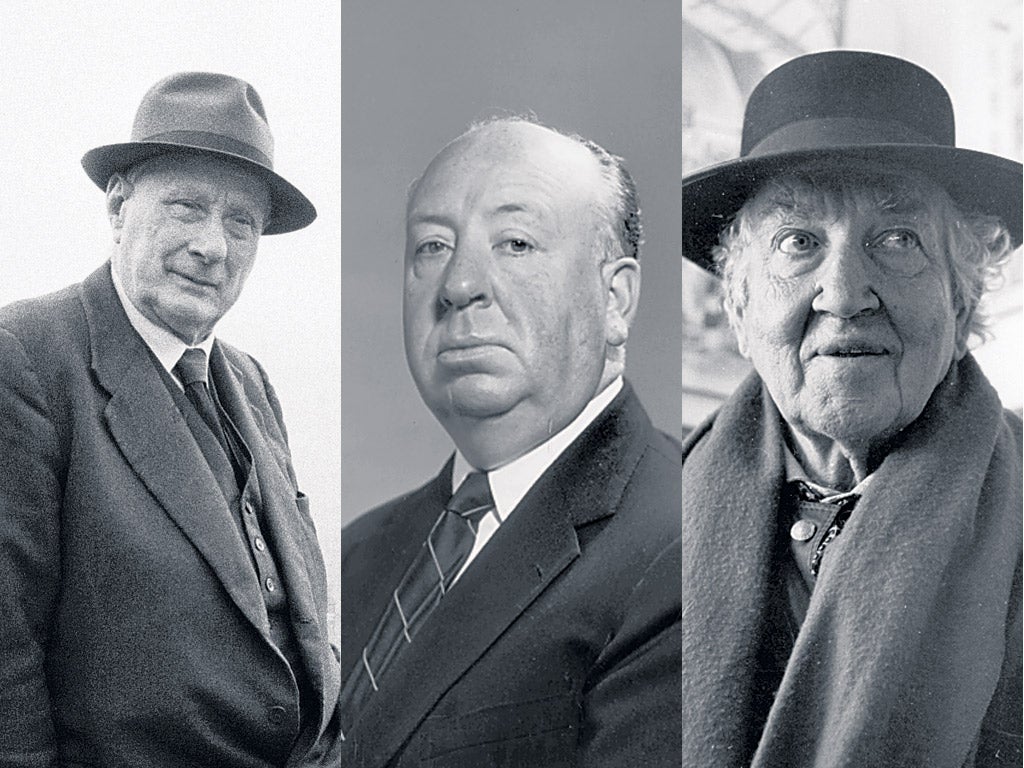An honour? No thanks: The reluctant dame, the artist who couldn't be bothered and the novelist who hoped for more
List from the Cabinet Office reveals those who rejected offers of enoblement.

A reluctant dame, a salt of the earth painter who "wasn't a show off" and a celebrated film director who thought he deserved better all appear on the list of eminent Britons to reject honours from the Monarch.
The Cabinet Office this week published the official list of those to refuse honours between 1951 and 1999, and who have subsequently died. In the past three years a further 116 have followed.
The record was held by the Lancashire painter LS Lowry, who turned down five honours including an OBE in 1955 and a CBE six years later. The painter, who was famous for his industrial landscapes, turned down a knighthood in 1968 and twice rejected becoming a Companion of Honour. Ivan Aird, who runs Grove Fine Art, knew Lowry growing up, as the painter made frequent visits to his father during the 1960s and 1970s.
He said: "Mr Lowry wasn't really interested in that sort of thing; he wasn't that kind of person. It wasn't because he was anti-establishment; he just wasn't a show off."
When then Prime Minister, Margaret Thatcher, wanted to meet Lowry, he "couldn't be bothered," Mr Aird said. She eventually arranged to visit him at home, but he died the day she was set to come. His work continues to fetch seven figures, and there is a gallery on the Salford Quays that bears his name. Mr Aird added: "If you were down to earth, Mr Lowry would have all day for you."
Another celebrated artist, Henry Moore, turned down a knighthood in 1951. He said in a letter to Downing Street that it was "difficult to explain why I feel unable to accept this very great honour". Yet, he feared accepting it as "such a title might tend to cut me off from fellow artists whose work has aims similar to mine". He was appointed Companion of Honour in 1955 and the Order of Merit less than a decade later.
In 1979, only a month after her general election victory over James Callaghan, Thatcher sought to make her former rival's wife a Dame. Audrey Callaghan, however, had other ideas and refused the honour.
She would eventually become Lady Callaghan of Cardiff eight years after she rebuffed the Iron Lady's offer. But that honour would come to her as s result of her husband's ennoblement in 1987. Her daughter, Margaret, was herself made a life peer in 1992 and as Baroness Jay of Paddington, served as Leader of the House of Lords.
War poet and classicist Robert Graves rejected a CBE in 1957, and would go on to reject the Companion of Honour in 1984. He told an interviewer: "I don't want any honours but I wouldn't so much mind being honoured for writing novels which sell abroad and earn money for England." The author of I, Claudius continued: "Writing poems is different. To get a CBE for being a poet would be absurd. But the government always tries to coax well-known writers into the Establishment; it makes them feel educated."
Brave New World writer Aldous Huxley was among those to turn his back on a knighthood, which he is thought to have refused because it was not consistent with his lifestyle. The author's work also included The Doors of Perception, which researched mind-altering drugs, and gave its name to the group The Doors. His brother Julian and half-brother Andrew, however, were both knighted.
There was speculation that three masters of their respective arts, were holding out for something a little more befitting of their talents when the authors Evelyn Waugh and film director Alfred Hitchcock turned down CBEs and poet Philip Larkin rejected an OBE. In the cases of both Hitchcock and Larkin, if they were bluffing, they won. The filmmaker was knighted months before his death, while the upgraded offer of an CBE was later accepted by Philip Larkin. Waugh, however, was not so lucky.
If Lucian Freud was playing a similar game when he turned down the offer of a CBE, he kept his cards close to his chest. His daughter, Jane McAdam Freud, told The Independent yesterday that she had "no idea" about his reticence to accept the honour. He was later appointed to the Order of Merit. Fellow artist Francis Bacon also turned down a CBE in 1960.
Leading article page 20Terence Blacker page 25
Thanks but no thanks: Artists who turned down honours
LS Lowry
The Lancashire painter, known for his paintings of industrial districts in the North of England, turned down a record five honours between 1955 and 1976. According to a family friend, he "wasn't interested in that sort of thing".
Alfred Hitchcock
The celebrated director of Psycho and The Birds is thought to have turned down a CBE in 1962 because he was holding out for a better bauble. He was knighted shortly before his death.
Aldous Huxley
The author of novels such as Brave New World and numerous short stories and essays rejected a knighthood in 1959 because he believed that such an award was not consistent with his lifestyle.
Robert Graves
He rejected a CBE in 1957 and then a Companion of Honour in 1984, saying such an honour "for being a poet would be absurd". He added that it was a move by the government to coax writers into The Establishment.
Subscribe to Independent Premium to bookmark this article
Want to bookmark your favourite articles and stories to read or reference later? Start your Independent Premium subscription today.

Join our commenting forum
Join thought-provoking conversations, follow other Independent readers and see their replies